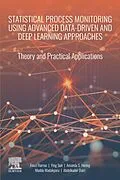Finally, the developed approaches are applied to monitor many processes, such as waste-water treatment plants, detection of obstacles in driving environments for autonomous robots and vehicles, robot swarm, chemical processes (continuous stirred tank reactor, plug flow rector, and distillation columns), ozone pollution, road traffic congestion, and solar photovoltaic systems.
- Uses a data-driven based approach to fault detection and attribution
- Provides an in-depth understanding of fault detection and attribution in complex and multivariate systems
- Familiarises you with the most suitable data-driven based techniques including multivariate statistical techniques and deep learning-based methods
- Includes case studies and comparison of different methods
Dr. Fouzi Harrou received the Ph.D. degree in systems optimization and security from the University of Technology of Troyes (UTT), France. He was an Assistant Professor at UTT for one year and was an Assistant Professor at the Institute of Automotive and Transport Engineering, Nevers, France, for one-year. He was also a Post-Doctoral Research Associate at the Systems Modelling and Dependability Laboratory, UTT, for one year. He was a Research Scientist with the Chemical Engineering Department, Texas A&M University at Qatar, Doha, Qatar, for three years. Since 2015, he has been Post-Doctoral Fellow with the Division of Computer, Electrical, and Mathematical Sciences and Engineering, King Abdullah University of Science and Technology. Dr. Fouzi Harrou is the author of more than 100 refereed journal and conference publications and book chapters. His current research interests include statistical decision theory and its applications, fault detection and diagnosis, and signal processing
Autorentext
Dr. Fouzi Harrou received the Ph.D. degree in systems optimization and security from the University of Technology of Troyes (UTT), France. He was an Assistant Professor at UTT for one year and was an Assistant Professor at the Institute of Automotive and Transport Engineering, Nevers, France, for one-year. He was also a Post-Doctoral Research Associate at the Systems Modelling and Dependability Laboratory, UTT, for one year. He was a Research Scientist with the Chemical Engineering Department, Texas A&M University at Qatar, Doha, Qatar, for three years. Since 2015, he has been Post-Doctoral Fellow with the Division of Computer, Electrical, and Mathematical Sciences and Engineering, King Abdullah University of Science and Technology. Dr. Fouzi Harrou is the author of more than 100 refereed journal and conference publications and book chapters. His current research interests include statistical decision theory and its applications, fault detection and diagnosis, and signal processing
Inhalt
1. Introduction
2. Linear Latent Variable Regression (LVR)-Based Process Monitoring
3. Fault Isolation
4. Nonlinear latent variable regression methods
5. Multiscale latent variable regression-based process monitoring methods
6. Unsupervised deep learning-based process monitoring methods
7. Unsupervised recurrent deep learning schemes for process monitoring
8. Case studies
9. Conclusions and future perspectives
